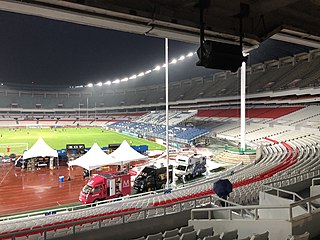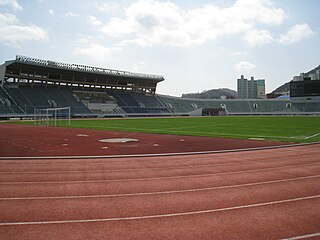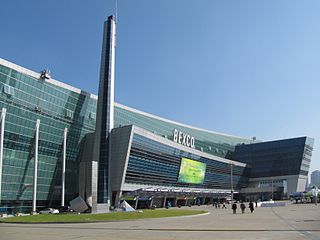
The 2002 FIFA World Cup, also branded as Korea Japan 2002, was the 17th FIFA World Cup, the quadrennial football world championship for men's national teams organized by FIFA. It was held from 31 May to 30 June 2002 at sites in South Korea and Japan, with its final match hosted by Japan at International Stadium in Yokohama.

The Ulsan Munsu Football Stadium, nicknamed Big Crown Stadium, is a football stadium in Ulsan in South Korea. It is home to the Ulsan Hyundai FC.

Daegu Stadium, also known as the Blue Arc, is a multi-purpose sports stadium located in Daegu, South Korea. It was formerly named Daegu World Cup Stadium but was changed to Daegu Stadium on 5 March 2008. It has a seating capacity for 66,422 people, and parking for 3,550 cars. It is located approximately 11 kilometers or 20 minutes by car from Daegu Airport. It is managed by the Daegu Sports Facilities Management Center.

The Seoul World Cup Stadium (Korean: 서울월드컵경기장), also known as Sangam Stadium, is a stadium used mostly for association football matches. The venue is located in 240, World Cup-ro, Mapo-gu, Seoul, South Korea. It was built for the 2002 FIFA World Cup and opened on November 10, 2001. It is currently the second largest stadium in South Korea after Seoul Olympic Stadium, and is the 2nd largest rectangular stadium in Asia. It was designed to represent the image of a traditional Korean kite. The stadium has a capacity of 66,704 seats, including 816 seats for VIP, 754 seats for press and 75 private Sky Box rooms, each with a capacity for 12 to 29 persons. Due to table seats installation, capacity was reduced from 66,806 seats to 66,704 seats in February 2014. Since the World Cup it has been managed by the Seoul Metropolitan Facilities Management Corporation (SMFMC). FC Seoul moved to the Seoul World Cup Stadium in 2004.

The 2002 Asian Games, officially known as the XIV Asian Games and also known as Busan 2002, were an international multi-sport event held in Busan, South Korea from September 29 to October 14, 2002, with the football event commenced 2 days before the opening ceremony.

Dongdaemun Stadium was a sports complex in Seoul, South Korea and included a multi-purpose stadium, a baseball park and other sports facilities. It was located near Dongdaemun or Great East Gate. The surrounding Dongdaemun market had many vendors selling athletics-related goods. It was demolished in 2008 to make way for the Dongdaemun Design Plaza & Park.

The Seoul Olympic Stadium, also known as Jamsil Olympic Stadium, is a multi-purpose stadium in Seoul, South Korea. It is the main stadium built for the 1988 Summer Olympics and the 10th Asian Games in 1986. It is the centrepiece of the Seoul Sports Complex in the Songpa District, in the southeast of the city south of the Han River. It is the largest stadium in South Korea.

Dongnae District is a gu in central Busan, South Korea.

The Azadi Stadium, opened as the Aryamehr Stadium, is an all-seater football stadium in Tehran, Iran. The stadium was designed by Abdol Aziz Mirza Farman-Farmaian Architects and Associates (AFFA) with other parts of the sports complex based on plans by Skidmore, Owings & Merrill, an American architectural, urban planning, and engineering firm due to the very short time frame for design and construction of the overall project. It was inaugurated on 17 October 1971 by Mohammad Reza Pahlavi, the last Shah of Iran; it is currently self-owned by Esteghlal and Persepolis. It is also the home stadium of the Iran national football team. It has a capacity of 78,116 spectators, as the result of conversion to all-seater stadium. The stadium is part of the much larger Azadi Sport Complex, and is surrounded by a rowing river, football training pitches, a weightlifting complex, swimming facilities and indoor volleyball and futsal courts, among many other amenities.

The Gwangju World Cup Stadium is a multi-purpose stadium in the South Korean city of Gwangju. It is managed by the Sports Support Division of the Culture & Sports Policy Office of the Gwangju Metropolitan city. Initially the stadium was named Gwangju World Cup Stadium to host some matches of the 2002 FIFA World Cup. To honour the former South Korean national team coach Guus Hiddink, who helped the team advance to the semi-finals, for the first time in its history, by defeating Spain in this stadium, they have also named it the Guus Hiddink Stadium.

Jeonju World Cup Stadium is a football stadium in the South Korean city of Jeonju. It is the home of Jeonbuk Hyundai Motors. The stadium's capacity is 42,477. The final of 2011 AFC Champions League was held at this stadium.

Daejeon World Cup Stadium is a football stadium in the South Korean city of Daejeon. It was used to host some matches at the 2002 FIFA World Cup hosted by South Korea and Japan. The stadium displayed a sophisticated structural dynamism, eliminating decorative decoration. Precast Concrete (PC) method considering construction and economical efficiency was used. After the World Cup, the stadium was planned to be a multi-purpose sports park, which has a comprehensive sports center and commercial and cultural facilities in the middle of the region. It is now the home stadium of Daejeon Hana Citizen with a capacity of 40,535 seats, replacing Daejeon Sports Complex.

The Incheon Munhak Stadium is a sports complex in Incheon, South Korea and includes a multi-purpose stadium, a baseball park, and other sports facilities.

The Busan Gudeok Stadium is a multi-purpose stadium in Busan, South Korea. It is currently used mostly for football matches. The stadium currently holds 12,349 spectators. The venue opened in September 1928 as Busan Municipal Stadium. During the 1988 Summer Olympics, it hosted some of the Olympic football matches. It was also the main venue for the 1997 East Asian Games hosting the opening and closing ceremonies, as well as the athletics and football competitions. Professional football team Busan IPark have played their home games at the venue since 2015 as well as between 1987 and 2002. Additionally, non-league football team Busan Transport Corporation FC have played their home games at the venue since 2006.

Busan Transportation Corporation FC, often referred to as 'the mighty' Busan Transportation Corporation FC is a semi-professional South Korean soccer club based in the city of Busan. The currently playing in K3 League for the 2020 season. They are owned and operated by Busan Transportation Corporation and play their home games at the Busan Gudeok Stadium, the spiritual home of football in the city and one of the venues for the 1988 Summer Olympics.

The Incheon Stadium, commonly known as the Incheon Asiad Main Stadium, is a stadium located in Incheon, South Korea. Completed in July 2014, it is used mostly for athletics meets and was the main venue of the 2014 Asian Games. The stadium has been designed with an initial capacity of roughly 60,000 spectators. After the 2014 Asian Games, capacity was reduced to 30,000 spectators. The stadium has an oval running track enclosing a regulation-size soccer field. Outside, there's a tennis court, a subsidiary stadium, and the 1,415.13 m2 Yeonhui Cricket Ground.

Busan Exhibition and Convention Center, commonly known as BEXCO (Korean: 벡스코), is a convention and exhibition center located in Centum City, Haeundae-gu, Busan, South Korea. It features over 46,500 m2 of exhibition space and 53 meeting rooms. In June 2012, BEXCO completed its expansion to add a 4,002-seat auditorium and a new exhibition center.
Seoul is a major center for sports in South Korea. Its professional sports teams compete in football (soccer), baseball, basketball, volleyball.
The bidding process for the 2023 AFC Asian Cup was the process by which the location for the 2023 AFC Asian Cup would be chosen as the hosts.
The 2019 EAFF E-1 Football Championship was the seventh edition of the women's tournament of the EAFF E-1 Football Championship, the women's football championship of East Asia. It was held in South Korea in December 2019.


















